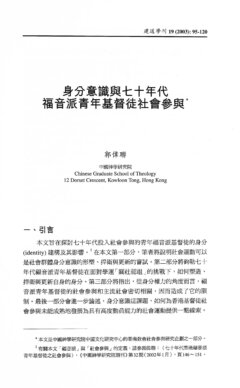身分意識與七十年代福音派青年基督徒社會參與/郭偉聯
撮要
本文探討投入七十年代社會參與的福音派青年基督徒的身分(identity)建構及其影響。筆者首先指出社會運動與社會群體身分意識之間的關係,接著鉤勒七十年代福音派青年基督徒在面對學運「關社認祖」的挑戰下,如何塑造、捍衛與更新自身身分。筆者又指出,從身分權力的角度而言,福音派青年基督徒的社會參與和主流社會密切相關,因而造成了它的限制。筆者最後運用克蘭德曼斯(Bert Klandermans)「集體行動識框」(collective action frame)概念來說明香港基督徒社會參與未能成熟地發展為具有高度動員能力的社會運動的原因。
ABSTRACT
The paper aims to investigate the identity construction of Hong Kong young Evangelicals of 1970’s and its impacts on their social participation. After a theoretical introduction to the relationship between social movement and identity, the paper illustrates the identity construction of Hong Kong young Evangelicals who were actively involved in social participation campaigns of 1970’s. The paper points out that, as to react to the challenge raised in the student movement that Christians were not patriotic and did not concern about the welfare of the Hong Kong society, the young Evangelicals tried to protect the “legitimacy” of their “Christian” identity by putting forward their own social participation and patriotic agenda. These moves showed the young Evangelicals tried to construct a distinctive “Christian-Hongkongese-Chinese” identity to withstand the pressure of student movement. And their actions eventually changed the conservative attitude towards social concern of churches in Hong Kong, thus reformulated the “social” identity of local churches. The paper also asserts that characteristics of this identity construction are similar to that of Manuel Castells’ legitimizing identity.
原載於《建道學刊》19期(2003年1月),頁95-120。







